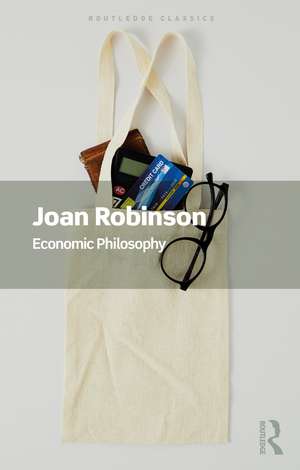Economic Philosophy: Routledge Classics
Autor Joan Robinsonen Limba Engleză Paperback – 29 mar 2021
InEconomic PhilosophyRobinson looks behind the curtain of economics to reveal a constant battle between economics as a science and economics as ideology, which she argued was integral to economics. In her customary vivid and pellucid style, she criticizes early economists Adam Smith and David Ricardo, and neo-classical economists Alfred Marshall, Stanley Jevons and Leon Walras, over the question of value. She shows that what they respectively considered to be the generators of value - labour-time, marginal utility or preferences - are not scientific but 'metaphysical', and that it is frequently in ideology, not science, that we find the reason for the rejection of economic theories. She also weighs up the implications of the Keynesian revolution in economics, particularly whether Keynes's theories are applicable to developing economies. Robinson concludes with a prophetic lesson that resonates in today's turbulent and unequal economy: that the task of the economist is to combat the idea that the only values that count are those that can be measured in terms of money.
ThisRoutledge Classicsedition includes a new foreword by Sheila Dow.
| Toate formatele și edițiile | Preț | Express |
|---|---|---|
| Paperback (1) | 136.24 lei 3-5 săpt. | +7.44 lei 7-13 zile |
| Taylor & Francis – 29 mar 2021 | 136.24 lei 3-5 săpt. | +7.44 lei 7-13 zile |
| Hardback (1) | 733.52 lei 6-8 săpt. | |
| Taylor & Francis – 29 mar 2021 | 733.52 lei 6-8 săpt. |
Din seria Routledge Classics
- 5%
 Preț: 132.94 lei
Preț: 132.94 lei -
 Preț: 101.14 lei
Preț: 101.14 lei - 5%
 Preț: 89.26 lei
Preț: 89.26 lei -
 Preț: 146.58 lei
Preț: 146.58 lei -
 Preț: 113.15 lei
Preț: 113.15 lei -
 Preț: 145.72 lei
Preț: 145.72 lei -
 Preț: 125.23 lei
Preț: 125.23 lei -
 Preț: 124.13 lei
Preț: 124.13 lei - 5%
 Preț: 88.37 lei
Preț: 88.37 lei -
 Preț: 124.19 lei
Preț: 124.19 lei -
 Preț: 109.78 lei
Preț: 109.78 lei -
 Preț: 123.98 lei
Preț: 123.98 lei -
 Preț: 121.89 lei
Preț: 121.89 lei -
 Preț: 93.84 lei
Preț: 93.84 lei -
 Preț: 109.24 lei
Preț: 109.24 lei -
 Preț: 86.93 lei
Preț: 86.93 lei -
 Preț: 95.54 lei
Preț: 95.54 lei -
 Preț: 92.66 lei
Preț: 92.66 lei -
 Preț: 144.84 lei
Preț: 144.84 lei -
 Preț: 146.51 lei
Preț: 146.51 lei -
 Preț: 94.66 lei
Preț: 94.66 lei -
 Preț: 110.69 lei
Preț: 110.69 lei -
 Preț: 92.77 lei
Preț: 92.77 lei -
 Preț: 110.32 lei
Preț: 110.32 lei -
 Preț: 64.19 lei
Preț: 64.19 lei -
 Preț: 122.91 lei
Preț: 122.91 lei -
 Preț: 123.12 lei
Preț: 123.12 lei -
 Preț: 110.89 lei
Preț: 110.89 lei -
 Preț: 86.43 lei
Preț: 86.43 lei - 20%
 Preț: 70.14 lei
Preț: 70.14 lei -
 Preț: 123.44 lei
Preț: 123.44 lei -
 Preț: 121.87 lei
Preț: 121.87 lei -
 Preț: 109.98 lei
Preț: 109.98 lei -
 Preț: 108.06 lei
Preț: 108.06 lei -
 Preț: 93.49 lei
Preț: 93.49 lei -
 Preț: 123.12 lei
Preț: 123.12 lei -
 Preț: 125.12 lei
Preț: 125.12 lei -
 Preț: 123.03 lei
Preț: 123.03 lei -
 Preț: 136.69 lei
Preț: 136.69 lei -
 Preț: 108.20 lei
Preț: 108.20 lei -
 Preț: 123.23 lei
Preț: 123.23 lei -
 Preț: 122.91 lei
Preț: 122.91 lei -
 Preț: 136.72 lei
Preț: 136.72 lei -
 Preț: 109.31 lei
Preț: 109.31 lei -
 Preț: 94.24 lei
Preț: 94.24 lei -
 Preț: 94.30 lei
Preț: 94.30 lei -
 Preț: 123.89 lei
Preț: 123.89 lei -
 Preț: 139.73 lei
Preț: 139.73 lei -
 Preț: 94.80 lei
Preț: 94.80 lei
Preț: 136.24 lei
Nou
26.08€ • 27.12$ • 21.85£
Carte disponibilă
Livrare economică 20 februarie-06 martie
Livrare express 06-12 februarie pentru 17.43 lei
Specificații
ISBN-10: 0367540878
Pagini: 156
Dimensiuni: 138 x 216 x 11 mm
Greutate: 0.18 kg
Ediția:1
Editura: Taylor & Francis
Colecția Routledge
Seria Routledge Classics
Locul publicării:Oxford, United Kingdom
Public țintă
General, Postgraduate, Undergraduate Advanced, and Undergraduate CoreCuprins
Notă biografică
Recenzii
"One of the greatest economic theorists of our time—and probably the greatest woman economist ever." - The New York Times
Descriere
Joan Robinson (1903-1983) was one of the greatest economists of the twentieth century and a fearless critic of free-market capitalism. A major figure in the controversial 'Cambridge School' of economics in the post-war period, she made fundamental contributions to the economics of international trade and development.
In Economic Philosophy Robinson looks behind the curtain of economics to reveal a constant battle between economics as a science and economics as ideology, which she argued was integral to economics. In her customary vivid and pellucid style, she criticizes early economists Adam Smith and David Ricardo, and neo-classical economists Alfred Marshall, Stanley Jevons and Leon Walras, over the question of value. She shows that what they respectively considered to be the generators of value - labour-time, marginal utility or preferences - are not scientific but 'metaphysical', and that it is frequently in ideology, not science, that we find the reason for the rejection of economic theories. She also weighs up the implications of the Keynesian revolution in economics, particularly whether Keynes's theories are applicable to developing economies. Robinson concludes with a prophetic lesson that resonates in today's turbulent and unequal economy: that the task of the economist is to combat the idea that the only values that count are those that can be measured in terms of money.
This Routledge Classics edition includes a new foreword by Sheila Dow.
